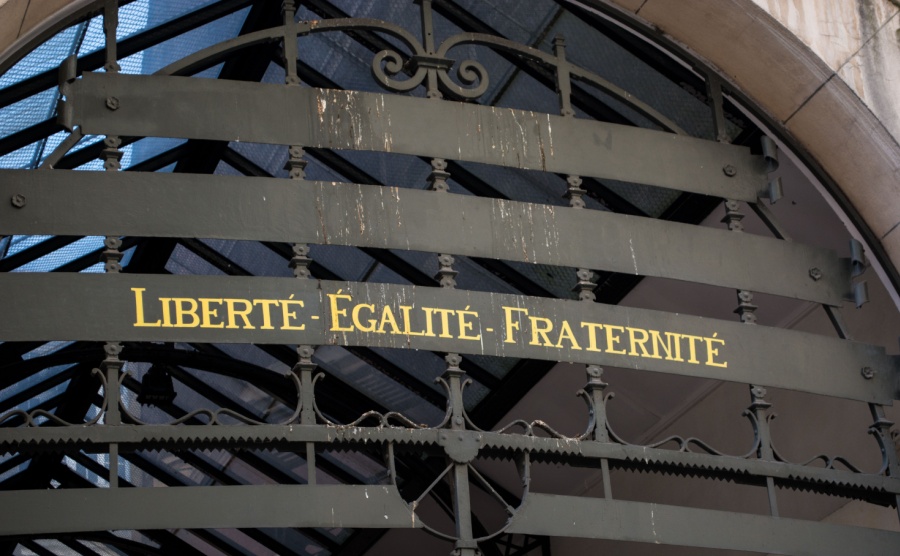This weekend marks Bastille Day in France, a day dedicated to the national celebration of the Féderation, that united people in 1789 during the French Revolution. The celebration has been reported as “the oldest and largest military parade in Europe” and is held on the Champs-Élysées in Paris each year on July 14th.
What better way to celebrate La Fête nationale française, than getting to terms with French values? There are things to know before you go, whether you’re moving to France permanently or spending a month or two there each summer.
In fact, as of January 2024, a new law came into play that requires expats wishing to renew their carte de résident to ‘respect the principles of the French Republic’. This law is set out in a ‘contrat d’engagement‘. Find more information on the exact law here.
In this article, we’ll introduce you to some of the more common French values and principles, to help you seamlessly integrate into life in France.

Find homes in France via our property portal.
“Liberté, égalité, fraternité”
Translating as ‘Freedom, Equality, Brotherhood’, the French motto is a phrase the French know well. You’ll often see it This is France’s motto and you will see it annotated on many town halls, schools and other public buildings across the country. It is something which every Frenchman adheres to and seems to be deeply embedded in French people’s psyche. It dates back to the French Revolution with a fair few theories as to where it comes from. The motto has become the emblem of French identity and is something anyone wishing to pursue French citizenship will have to learn about.

Family members coming together is a sight to behold in France
Everyday values in France
When living in France, you’ll immediately notice the country’s strong family values. This is evident not only in terms of how the French live but also in the rules which exist to protect family members. You cannot disinherit your children in France for example. When you pass away, a portion of your assets is set aside for them whether you like it or not. A sense of obligation is instilled in most children as they grow up and thus in practice, the generations mix more frequently and easily than perhaps in other countries. Equally, children are expected to care for their parents and care for them in their old age.
One of the most heartwarming things in France is to witness celebrations where family members of all ages come together. This is far more common than in the UK.
Another noticeable French value is a real sense of community, particularly in smaller villages. This often seems like an extension of family values and perhaps in some ways it is! People naturally look out for each other and welcome newcomers. Contrary to the rather hackneyed belief that the French can be snooty about foreigners, in most parts of the country they are warm and friendly (yes, even if your French is a little rusty!).

Making friends in France is a lot easier than you think
The French mostly come across as intensely proud of their ways; they value close relationships and look out for each other. In some aspects of life, their ways may seem more formal than our own. For example, it is quite normal to shake hands with everyone one meets, even if they are already friends. French values are all about courtesy, family and friendship.
It is also noticeable that the French have a strong sense of patriotism; they know they have a country rich in history and love to show off its beauty. This of course is something any Francophile will quickly understand!
Finally, it may be worth mentioning the Napoleonic Code. This was established in 1804 and still seems to hold in the psyche of many a French person today. Briefly, the Code says that all citizens are equal in terms of the law, there is freedom of religion (as above), everyone has the right to own property, and family law means everyone must abide by the rules for marriage, divorce and inheritance, and that civil liberties should be upheld.
The four pillars of the French Republic
Officially, The French Constitution defines the French Republic as having four pillars: indivisible, secular, democratic and social. But what do they mean?
Let us take a brief look at each pillar and then consider some general French values which apply to everyday life.
Indivisible
This means that nobody is exempt from the laws of the French Republic. The principle of unity means that all laws and duties are the same throughout the country. It also means that there is only one official language – French. Regional variations like Occitan and Breton are legally recognised but are not deemed to be official languages.
Secular
The laws on secularism (laicité in French) date back to 1905. In a nutshell, this means that all French residents are entitled to hold their own religious beliefs but religion does not play any part in the state . In broader terms, this means that cribs at Christmas are not permitted in public places and any employees of the state are not permitted to wear any symbols of religion such as the hijab scarf or the kippah.
This particular law is very often touched on in interviews held to obtain French citizenship. They are looking for the applicant’s knowledge of France, its history and mores and secularism is very much at the heart of the French psyche.
Democratic
This concept is about freedom in terms of religious belief, marriage and expression. It means that ideally all citizens should have the same value in the eyes of the State, whatever their wealth, gender, education etc.
Social
This follows on from the democratic part: the idea that equality reigns supreme.
You might also like:











